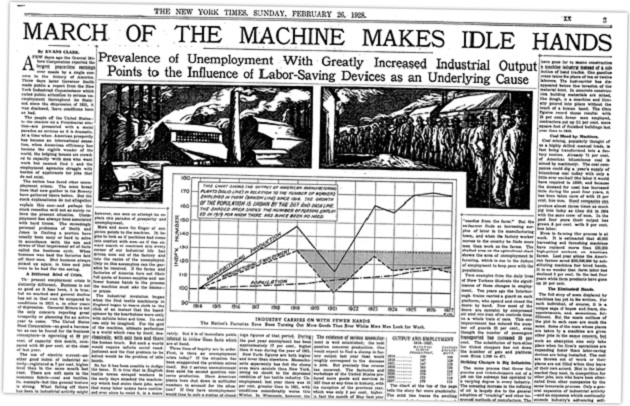Stephen’s note: Before we dive in, a quick word on the debt ceiling.
If you missed the news, Congress raised the debt limit for the 103rd time yesterday.
Many investors were freaking out over the past few weeks over fears America was about to default on its debts. RiskHedge readers knew better.
As we've predicted since January, and as I said a couple weeks ago:
“This is all just political theater. The debt ceiling debate makes bureaucrats feel important. They use it as a negotiating tactic to get what they want. Republicans and Democrats argue for a couple weeks before coming up with a plan, which allows both sides to spend more of your money.”
That’s exactly what happened.
The lesson is, it usually pays to ignore the drama created by the financial media and instead focus on investing in great businesses.
Now, let’s dive in.
***
It’s 1955. You’re a Detroit autoworker.
Motor City has boomed for the past half-century. It’s grown from small town to metropolis, driven by the auto industry.
Henry Ford hired your father right as Model T sales were taking off. The number of autoworkers has 10X’d since he stepped onto the assembly line. Now, Ford (F) and General Motors (GM) are two of America’s largest and most powerful companies.
Detroit is the richest city in the world.
Life is good.
Little do you know, it’s about to be turned upside down…
- Over the coming years, hundreds of thousands of autoworkers—yourself included—will be laid off.
Detroit will crumble. Violent crime will spike. The Ford stock you’ve been steadily buying with every paycheck will flatline.
You thought you were raising your kids in the richest city on Earth. But Detroit will file for bankruptcy in their lifetimes.
Think about the most valuable advice someone could have given you while you were at the top of the world:
“Look, pal. Things are about to change around here. Detroit’s finished. Get out while the going is good. You don’t want to end up like those fools who thought the steel industry was gonna last forever.
Start thinking about the future. I hear these kids out in California are doing some incredible things with computers. And for God’s sake, sell some of that Ford stock.”
This advice could have changed the course of your and your family’s life.
I’m telling you this because we’re at another pivotal moment in history.
There are many “Detroit autoworkers” walking among us, unaware of a disruptive nuclear bomb that’s about to explode...
- I want to make sure you’re ready for what’s coming.
As the guy who’s dedicated his career to investing in disruption, I’m compelled to show you how to thrive in the artificial intelligence (AI) age.
On Monday, I showed you how to use ChatGPT as your personal intern.
I showed you the industries AI could soon transform beyond recognition... and much more.
- Today, we’ll look at how to take the right AI “elevators”...
Many folks are predicting AI will soon steal all our jobs. Yet, people have had this same concern for more than 100 years.
Look at this doozy of a headline from The New York Times in 1928, which suggested machines would soon put people out of work. I could show you a dozen more predictions just like it from every decade.
 Source: The New York Times
Source: The New York Times
We’ve been deploying new technologies for centuries—in everything from industrial machines to spreadsheets. Yet, folks always think this “next” wave of automation will be the one that takes all the jobs.
If AI causes mass unemployment, it would be the first technology in history to do so.
Now, it’s true that most inventions do destroy some jobs.
Automobiles put buggy makers (and horses) out of business, for example. AI will follow this pattern.
Thinking about jobs over the coming years reminds me of something former Goldman Sachs CEO Lloyd Blankfein said. When discussing his advice for young people, he quipped: “You’ve got to be in the right elevator.”
AI will create millions of good-paying jobs. Prompt engineers—people who spend their days coaxing AI to produce better results—are already earning six-figure salaries. But ChatGPT and its ilk will likely decimate other careers.
Taking the “right elevators” and avoiding the ones set to freefall is crucial. It’s what every 1950s Detroit autoworker wished they’d known.
It’s also what we, as workers and parents, must think about today.
- These are the industries that will thrive… and the ones that will perish.
Before the Industrial Revolution, skilled artisans painfully stitched together every suit and hand-crafted every table. Fast-forward 100 years, and everything was being made by machines.
Yet, the number of manufacturing employees surged during this period.
If a machine allows one man to do the work of five, wouldn’t that mean the other four get laid off? Not if people are buying those products faster than you can make them, which is what happened during this period.
Ditto for Motor City. In 1910, it took autoworkers 12 hours to construct a single car. Then Henry Ford invented the assembly line, which slashed car manufacturing to 90 minutes.
And guess what happened to auto employment over the next four decades? It surged 10X. Americans were buying cars faster than Ford could make ‘em.
AI does for many “knowledge workers” what the assembly line did for autoworkers.
Software engineers using Copilot get work done in half the time. Counterintuitively, this will increase the number of coders… and their wages.
Just like cars in 1910, the world has an insatiable appetite for software. We use everything from Duolingo (DUOL) for learning a language… to Uber (UBER) for getting around… to TurboTax for taxes.
We’ll buy software as fast as coders can write it.
Other jobs that aren’t as “in demand” will suffer. Say AI farming robots made avocado pickers 10X more productive. Would you buy 10X as many avocados? No. That means AI will likely destroy jobs in these markets.
The “right elevators” in the AI age are markets which benefit from a bottomless appetite for their products or services.
They aren’t only immune to AI’s disruption but are winners from it, too. They’re also the industries you should learn about and encourage your kids to get into.
You’ll also want to pay close attention to the new jobs AI will enable. Two decades ago, podcast host… YouTuber… and blogger weren’t considered “real” jobs. Thanks to the internet, many people earn millions of dollars a year in these new roles.
Maybe the best jobs of the next 20 years haven’t even been invented. My advice is to focus on a career we don’t yet have a word for. “Prompt engineer” is just the first example.
Stephen McBride
Chief Analyst, RiskHedge





